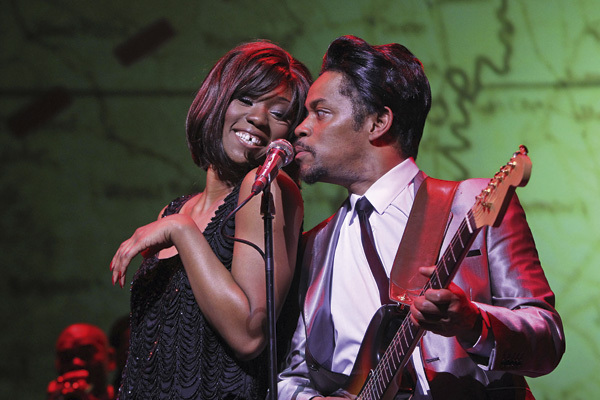Be still, at last, you clamouring brainboxes. Those who long for more highbrow drama in the West End can thank God for David Edgar’s Written on the Heart. Commissioned by the RSC, this celebratory play tells the story of the King James Bible, which was first published in 1612. Making scripture accessible to the masses represented a huge moral and cultural upheaval. In 1536 William Tyndale had been executed in Flanders for translating the Bible into English, but just eight decades later the king himself ordered a new vernacular version and showered the translators with rewards.
Edgar is no slouch when it comes to taking on lumpish, glutinous topics and he relates the entire story of the English Church during the 16th century. It’s a sprawling tale of hot-headed clerics, quibbling Hebrew scholars and rabid Puritans touring the countryside bashing in stained-glass windows with mallets. The old conflict between self-denial and self-expression is channelled into a war of religious ornament. The Puritan austerity-huggers were desperate to break the will of the censer-swinging high Anglicans. And Edgar, evidently a swinger himself, pithily summarises the Puritan motive: ‘They love God with all their soul and hate their neighbour with all their heart.’ Much of the script turns on the minutiae of biblical translation, on the precise nuances of individual words, and on the musical cadences of English vowels. The translators used a grand and remote idiom which, even in 1612, felt archaic. They wanted the Bible to sound majestic rather than conversational.
Clearly, this material doesn’t lend itself to the theatre. There’s no unifying character, no suspense or romance, and very little physical action. But Edgar creates an entertaining show, just about, by combining thorough scholarship with a populist touch. There’s a great comic scene in a cathedral where a wench is bribed by a randy deacon to give him a quick flash of her assets. Up goes the wench’s top. And in walks the bishop. The pop-eyed cleric himself is none other than Lancelot Andrewes, overseer of the translation committee. Oliver Ford Davies plays him as a snowy old father figure with mischievous eyes and a lovely, dripping-trickle voice. Ford Davies commands an amazing treasure-house of stage effects. He has the geniality of Santa Claus, the solemnity of Moses and the comic timing of Kenneth Williams. He knows exactly how to tickle audiences into laughter with a tiny sideways glance or a small booming ‘humph!’. None of the others can quite match his presence but there’s decent work from Paul Chahidi as a lecherous prelate and from Simon Thorp as a hoity-toity Catholic landowner. This is a slow-burner of a play that ensnares you gradually but inexorably. By the end, the audience was chortling knowingly as classicists debated the merits of ‘elder’ versus ‘priest’, or ‘congregation’ versus ‘church’ to translate technical terms in the New Testament. That, in itself, is a miracle. Showbiz has climbed the ivory tower.
Soul Sister, a new musical about Ike and Tina Turner, is very nearly outstanding. The music, the costumes and the cultural mood of the Sixties and Seventies are superbly evoked. The narrative, inevitably, is reduced to snatched conversations in hotel rooms. The joint biography seems lopsided because Ike is a much darker, more gripping character than the genteel teenager, Anna Mae Bullock, whom he transformed into ‘Tina’.
As a child, Ike saw his father lynched by a mob of rednecks and this left him with a lifelong sense of grievance and paranoia. Success never satisfied him. By the 1970s the couple’s career had foundered and their marriage was over. Ike is portrayed as a hopeless coke addict stumbling about his mansion wearing a swirly toothpaste-explosion shirt and an Afro wig like a double helping of candyfloss. Tina meanwhile has turned Buddhist. And Ike starts to turn psycho. One day he wallops her in the gob while she’s ascending towards nirvana and she packs her bags and leaves.
At which point her story becomes more fascinating than his. In less than a decade Tina transformed herself from a penniless punch-bag, who didn’t even own the rights to her stage name, into the world’s biggest female star. That amazing turnaround is condensed into a few brisk gestures here so that the show can focus on heart-thumping hits like ‘Private Dancer’ and ‘Steamy Windows’.
Emi Wokoma has just the right voice for Tina — huge and husky. Early on, her dancing seems too schooled and considered. Later she lets rip and delivers a classic Tina ‘shuffle’. Madly shaking her silver-spangled dress, she wobbles and waggles across the stage like a turkey with its legs tied together being pursued by Bernard Matthews. Chris Tummings creates a highly memorable Ike: a broody, stingy, charismatic dictator. And yet somehow we’re on his side.







Comments